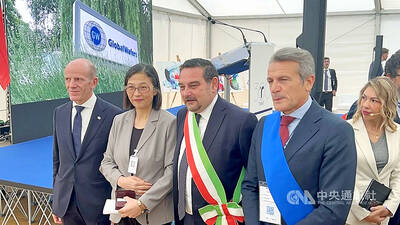Global vehicle production by Toyota Motor Corp and Nissan Motor Co declined last month because of a prolonged slump in the US auto market amid growing recession fears, data released yesterday showed.
Toyota, Japan’s top automaker, produced 789,224 vehicles last month, down 1.3 percent from a year earlier. It marked the second consecutive month of year-on-year declines.
“Demand in the US market remains stagnant. We are seeing a fall in demand for trucks there,” said Toyota spokesman Paul Nolasco. He added sluggish demand in Japan also pressured Toyota’s global output.
Earlier, Toyota said its global sales in the July-September quarter fell for the first time in seven years because of faltering demand in the US. The company sold 2.24 million vehicles worldwide during the quarter, down 4 percent from the same period last year. It marked the first year-on-year decline in the July-September period since 2001.
Toyota’s rival Nissan said its global production last month slipped 0.3 percent from a year earlier to 316,082 units.
“The biggest reason for the output decline was cooling demand in the US market,” Nissan spokeswoman Haruko Wada said.
Nissan’s sales in the US dropped 36.8 percent last month, while those by Toyota slumped 32 percent as Americans tightened their purse strings amid the deepening financial crisis.
Nissan said last week it would cut auto production at its two Japanese plants because of falling US sales. Nissan was also laying off 1,680 workers in Spain because of poor demand.

RECYCLE: Taiwan would aid manufacturers in refining rare earths from discarded appliances, which would fit the nation’s circular economy goals, minister Kung said Taiwan would work with the US and Japan on a proposed cooperation initiative in response to Beijing’s newly announced rare earth export curbs, Minister of Economic Affairs Kung Ming-hsin (龔明鑫) said yesterday. China last week announced new restrictions requiring companies to obtain export licenses if their products contain more than 0.1 percent of Chinese-origin rare earths by value. US Secretary of the Treasury Scott Bessent on Wednesday responded by saying that Beijing was “unreliable” in its rare earths exports, adding that the US would “neither be commanded, nor controlled” by China, several media outlets reported. Japanese Minister of Finance Katsunobu Kato yesterday also

‘DRAMATIC AND POSITIVE’: AI growth would be better than it previously forecast and would stay robust even if the Chinese market became inaccessible for customers, it said Taiwan Semiconductor Manufacturing Co (TSMC, 台積電) yesterday raised its full-year revenue growth outlook after posting record profit for last quarter, despite growing market concern about an artificial intelligence (AI) bubble. The company said it expects revenue to expand about 35 percent year-on-year, driven mainly by faster-than-expected demand for leading-edge chips for AI applications. The world’s biggest contract chipmaker in July projected that revenue this year would expand about 30 percent in US dollar terms. The company also slightly hiked its capital expenditure for this year to US$40 billion to US$42 billion, compared with US$38 billion to US$42 billion it set previously. “AI demand actually

Jensen Huang (黃仁勳), founder and CEO of US-based artificial intelligence chip designer Nvidia Corp and Taiwan Semiconductor Manufacturing Co (TSMC, 台積電) on Friday celebrated the first Nvidia Blackwell wafer produced on US soil. Huang visited TSMC’s advanced wafer fab in the US state of Arizona and joined the Taiwanese chipmaker’s executives to witness the efforts to “build the infrastructure that powers the world’s AI factories, right here in America,” Nvidia said in a statement. At the event, Huang joined Y.L. Wang (王英郎), vice president of operations at TSMC, in signing their names on the Blackwell wafer to

Taiwan-based GlobalWafers Co., the world’s third largest silicon wafer supplier, on Wednesday opened a 12-inch silicon wafer plant in Novara, northern Italy - the country’s most advanced silicon wafer facility to date. The new plant, coded “Fab300,” was launched by GlobalWafers’ Italian subsidiary MEMC Electronics Materials S.p.A at a ceremony attended by Taiwan’s representative to Italy Vincent Tsai (蔡允中), MEMC President Marco Sciamanna and Novara Mayor Alessandro Canelli. GlobalWafers Chairwoman Doris Hsu (徐秀蘭) said the investment marked a milestone in the company’s expansion in Europe, adding that the Novara plant will be powered entirely by renewable energy - a reflection of its